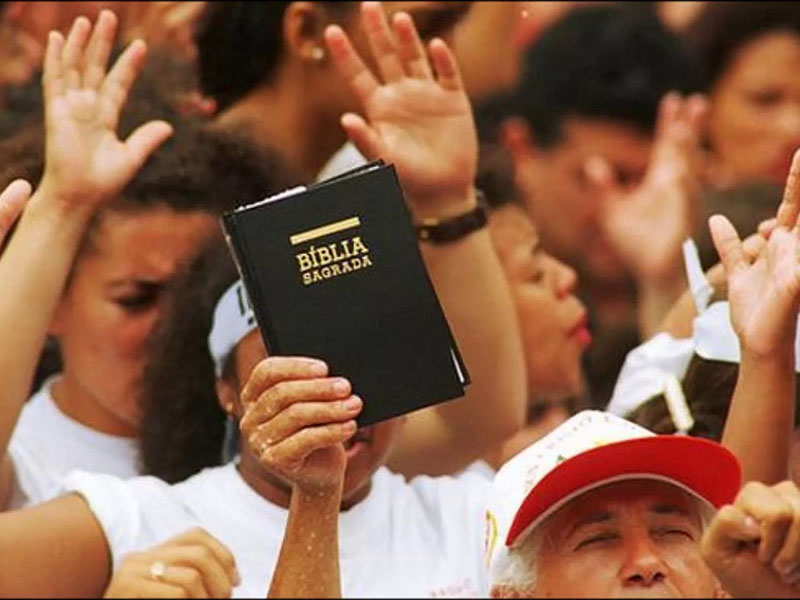RIO DE JANEIRO, BRAZIL – Even though the campaign has not yet begun, Brazil’s presidential hopefuls are already mobilizing to seduce the evangelical sector, which was crucial for Jair Bolsonaro’s election in 2018 and tends to be increasingly decisive, according to experts.
Bolsonaro, who, according to polls, would lose the October elections to former president Luiz Inácio Lula da Silva, aspires to reelection with the promise to continue working to defend Christian values.
This “is a government that proudly says it believes in God (…) that defends the Brazilian family”, said the right-wing leader, who recently fulfilled his promise to appoint André Mendonça, a “terribly evangelical” judge, to the Supreme Court.

For its part, Lula’s Workers’ Party (PT) will launch next month a podcast with interviews of exclusive interest to evangelicals, as part of a strategy designed by a pastor who met with the former leftist president (2003-2010).
Pastor Paulo Marcelo Schallenberger guided Lula da Silva on how to approach and overcome distrust concerning the PT’s usual agenda, more liberal than the one defended in the temples, a party source confirmed to AFP.
Even the former judge of the anti-corruption operation “Lava Jato”, Sergio Moro, third in the polls, pledged before religious leaders to be faithful to 14 principles. Among them is to fight against the expansion of abortion.
“The movements of the candidates are showing the relevance that the evangelical market has for politics,” political scientist André Cesar of the Hold consulting firm told AFP.
In Brazil, evangelicals represent almost a third of the population – some 70 million – and some projections indicate that in a decade, they could surpass Catholics in the country with the largest number of followers of that religion in the world.
BOLSONARO’S MAIN BASTION
Despite the wear and tear that Bolsonaro has suffered, the president retains the religious sector as his main bastion.
A 44% of them would vote for him in the first round on October 2, while 32% would be inclined to vote for Lula, according to a PoderData poll conducted this month. Other pollsters have estimated a scenario of greater parity between Bolsonaro and his rival.
The religious vote was decisive in tipping the balance in favor of Bolsonaro in 2018. According to polls, in the runoff between Bolsonaro and the then PT candidate, Fernando Haddad, 70% favored the current president, who, despite being Catholic, is married to an evangelical and had approached that electorate.
During the campaign, the president accused the PT of promoting the sexualization of children and of having delivered in schools an alleged “kit” that taught how to be homosexual, something cataloged as false information by the Electoral Court. Later, in government, he appointed evangelicals to lead ministries such as Pastor Damares Alves in the Human Rights portfolio.
Bolsonaro “shares with evangelicals the same values on homosexuality, abortion, and the importance of the traditional family. He is not the ideal candidate, but the possible candidate,” Juliano Spyer, anthropologist and author of the book “Povo de Deus,” an X-ray of Brazilian evangelicals, told AFP.
A QUESTION OF VALUES
Sóstenes Cavalcante, a federal deputy and leader of the powerful Evangelical parliamentary front, told AFP that he believes that, despite the economic hardships into which some evangelical Brazilians fell, the majority will again vote for Bolsonaro.
“With this government, we did not have to fight affronts to our values,” said Cavalcante, a Bolsonaro ally. “In the PT administrations, we lived preventing projects of legalization of abortion, homosexual marriage, or sexualization of children in schools.”
The pastor believes Bolsonaro could win the elections if he adopts economic relief measures, but that “even with the crisis, the evangelical will be governed by values” and, therefore, they will mostly vote for the right-wing candidate.
Spyer highlighted that although the typical Brazilian evangelical is black, suburban, and female, which puts that profile in collision with some of the president’s policies, such as the decision to relax access to weapons, Bolsonaro embraced Christianity “in an integral way”.
“Evangelicals never had as much space as they do now. The next presidents will have to start from that reality.”
With information from AFP

